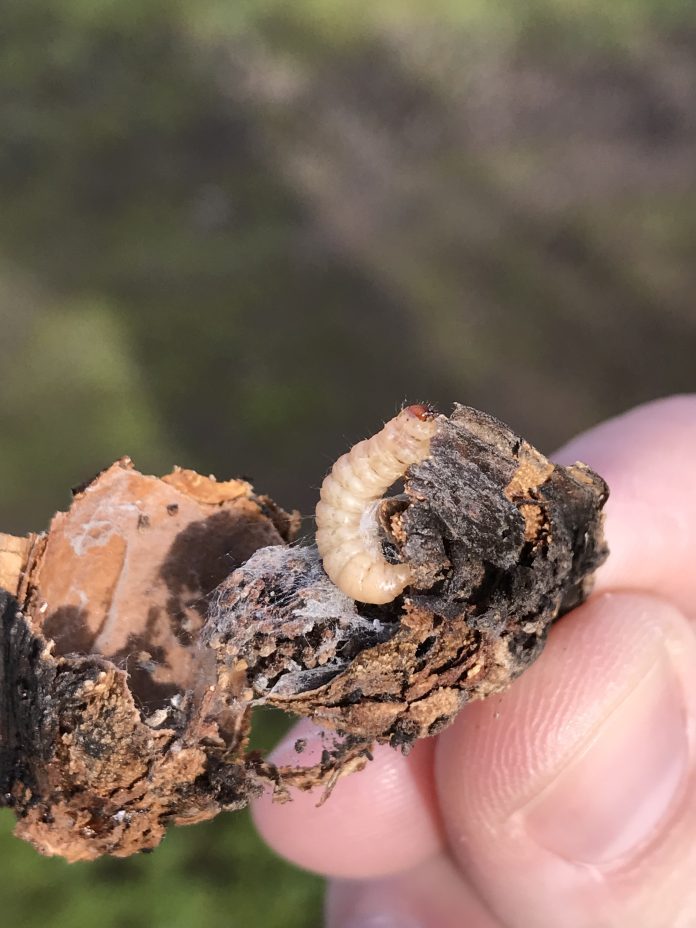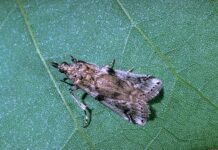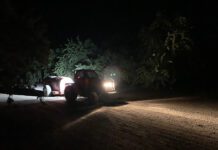Winter sanitation for navel orangeworm (NOW) is still one of the most critical practices growers have in their toolbox to reduce NOW numbers, according to Luke Milliron, UCCE orchard systems advisor for Butte, Glenn and Tehama counties.
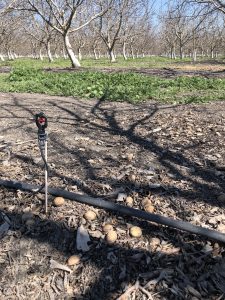
NOW Numbers
Milliron found several things troubling about NOW in the Sacramento Valley this year.
“First, I definitely heard rumors of some really high navel orangeworm levels this year, so I think that’s very concerning,” he said, adding a lot of growers had significant NOW infestation.
Second, many almond growers also struggled with the weather in the northern Sacramento Valley in 2022. Many growers experienced freeze damage and didn’t harvest their crops, so there are still nuts in the orchard.
“Unfortunately, there was only enough crop to create overwintering mummy nuts, so that’s really concerning for making sure that those do finally get shaken and mowed,” Milliron said.
Sudan Gyawaly, IPM advisor for the Sacramento Valley, agreed nuts were left in the tree, and he hopes that growers will continue to do winter sanitation. If the mummy nuts aren’t removed, they not only increase next season’s navel orangeworm numbers by hosting larvae over the winter, but they also serve as the only place where adult females lay eggs in early summer, he added.
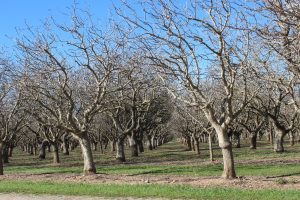
Prices
Nut prices are down which means growers are searching for ways to reduce costs.
“Almond prices are not good and walnut prices are absolutely atrocious,” Milliron said, adding I understand walnut growers skipping winter sanitation when NOW isn’t as much of a problem annually compared to almonds.
“While winter sanitation is technically the right thing to do, you’ve got to start by looking at your books,” Milliron advised, and the reality may be that winter sanitation ends up much, much further down the list.
Gyawaly is also concerned that because nut prices are down in all nut crops, especially walnuts, growers may skip winter sanitation, which could result in higher NOW pressure in the coming years.
Nut prices are low, and at the same time input costs continue to increase (gas, pesticides, water, etc.), so growers may not do winter sanitation.
“That’s my really big concern right now,” Gyawaly said, adding this could result in much higher numbers of NOW.
“I have seen one grower especially struggling to even keep his trees alive because he cannot afford to irrigate them enough,” Gyawaly said, adding in that kind of situation, the grower may not harvest the crop, and those nuts become mummies and the host for overwintering NOW.
But not doing winter sanitation builds up the population in the whole valley, Gyawaly stressed.
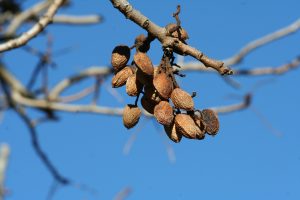
Nut Damage
“I haven’t heard yet whether there was bad navel orangeworm in walnuts this year,” Milliron said, adding grade sheets are still coming in.
“I would be concerned that there might be elevated levels this year because we had this weird early rain in the middle of almond harvest and the walnut husks flew open after that. And so definitely they [walnuts] were vulnerable to infestation for a long, long time,” Milliron said, and while he’s not getting calls about NOW damage, he has received calls about black hulls and either mold or black kernels in walnuts.
“There have been some atrocious levels that many ag commissioners are looking into. It doesn’t look like it’s raising to the level of a crop disaster, but if it’s bad, it may be on the order of 5% to 10% across Butte County,” Milliron said, adding 30% damage is needed to declare a crop disaster.
Winter Sanitation
It’s important to consider what the impact will be if the orchard isn’t sanitized, Gyawaly said.
“When you talk about navel orangeworm management, winter sanitation is the foundation,” Gyawaly said. “Previous research showed that if you just rely on pesticides, it’s not going to work. Even if you spray the best of the pesticides, you are always going to get some unacceptable damage.
“Winter sanitation is probably one of the most important practices to minimize the damage to an acceptable level,” Gyawaly said, adding managing NOW is a combination of effective monitoring and utilizing available tools, such as winter sanitation, mating disruption, spray applications at hull split and timely harvest.
And the other side of that is chemicals are expensive, too, and prices keep increasing, so winter sanitation could result in fewer chemical applications during the season and save growers money, Gyawaly said.
When Should Winter Sanitation be Done?
Doing winter sanitation too early results in more difficulty removing the nuts.
“In the Sacramento Valley especially, we have foggy weather, so that helps for the nuts to drop easily when we shake, so it’s better to wait until there’s some rain and some fog at the same time,” Gyawaly said.
But too much rain could make it difficult to get machines into the orchard to shake, so starting winter sanitation is a balance between getting wet weather, but not too much, Gyawaly said.
Shaker Head for Mummy Removal
Multiple University of California agricultural engineers including Uriel Rosa, John Miles and now Reza Ehsani; University of Cordoba, Spain; Sergio Castro Garcia; and industry harvester fabricator Phil Scott, owner of Ag-Right, have cooperated with UCCE Specialist Louise Ferguson on a canopy contact harvester for table olives. They also demonstrated the head of this shaker has potential as a fast continuous mummy knocker for pistachio and possibly almond. The application of this technology for mummy removal needs to be investigated further through rigorous field testing before being considered a viable option for removing mummies.
Do Something
“From the IPM perspective, winter sanitation is really important. It’s one of the essential practices for an effective NOW integrated pest management program,” Gyawaly said, adding growers have to balance the cost, look at their present and future crop value and the cost if they don’t do winter sanitation.
Growers may choose to skip winter sanitation this year because the prices are low and they’re struggling to make any profits.
“A perfect scenario would be removing mummy nuts and getting it down to less than two mummy nuts per tree,” Gyawaly said. “But again, if your situation doesn’t allow for that, I think anything counts. Anything you can do to get rid of those nuts really counts.”
Milliron agreed and said doing something is better than doing nothing at all. “Even if you don’t go through and shake every tree again this winter, just make sure you go through and flail mow what’s on the ground. Doing something is better than doing nothing at all. So, if you can, don’t completely walk away from winter sanitation,” Milliron said.
“Winter sanitation is like so many other things in life; it’s an insurance program. It’s the best insurance program for navel orangeworm we know. Some years it’ll pay for itself, other years it won’t, but you do it every year because you don’t know what next year will hold,” Milliron said.



